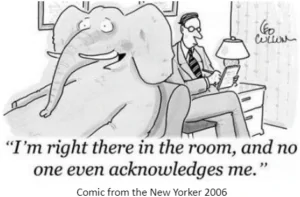What Do Elephants in the Room Cost You?
by Robert Hackman
Photograph by David Clode on Unsplash+
No one wants to talk about the elephant in the room
We’re all afraid he’ll knock us out and send us to our doom
Lyric from the song Elephant in the Room
By Lounge Doctors
I’ve sat through weekly meetings that involved the entire company’s leadership. Ostensibly, they were designed to plan the week’s production to fulfill the expected demand. In reality, the company’s financial constraints were the deciding factor. They were also the ‘elephant in the room’ that could not be mentioned.
The planning, problem-solving discussions, and debates about matching pending sales with availability were performative. Only two people would decide whether the production lines would run over the weekend: the CEO and the CFO. It would be determined by cash flow and not by anything else discussed with the assembled managers.
The CEO did not want to lose esteem. Consequently, the extraordinarily costly meetings were a waste of time.
I have witnessed meetings and cultures where specific competitors’ capabilities, broken systems, lack of accountability, inadequate communication and direction, and the flouting of core values were off-limits and could not be spoken.
What elephants hide out in the rooms of your company?
What is an ‘elephant in the room?’ How do they get created? What do these ‘elephants in the room’ cost leaders, teams, and companies?
What is an ‘elephant in the room?’
An ‘elephant in the room’ is an idiom representing a situation when everyone knows about an important topic, yet no one is willing to mention or discuss it.
It is as if an issue as obvious as an elephant that cannot possibly be missed is ignored by all, like they are oblivious to its presence.
How Do ‘elephants in the room’ Get Created?
Elephants in the room are made in three primary ways.
‘Elephants’ occur when the prevailing cultural norms dictate that certain subjects remain taboo and are eliminated from consideration or utterance. These shared beliefs can arise from an ethos of not airing dirty laundry in public. Or stem from a code of not throwing anyone or any department under the bus in public.
Sometimes, they get formed by an agreement, spoken or otherwise, that significant topics must be avoided during meetings to avoid dealing with them.
Most often, ‘elephants in the room’ are generated by a person or people with power over others who will inflict penalties on those who break the rule. Those who speak up are subjected to animosity, getting sidelined, or penalized for not being team players, up to and including termination.
‘Elephants in the room’ represents a willful collective denial that necessitates the collusion of all involved. It is challenging to describe the power they wield over teams and organizations adequately.
What Do ‘elephants in the room’ Cost Leaders, Teams, and Organizations?
Elephants can occur in organizations and groups of any size. Once in place, they can be difficult to dislodge. Just ask any leader tasked with changing behavioral norms.
One of the best-known examples of this was Alan Mullally during his time at Ford Motor Company when its executives refused to admit anything was wrong in their departments despite the company’s failed performance and hemorrhaging of cash.
The company’s leaders had learned to keep quiet. The culture at Ford that Mullally committed to changing was that executives admitting difficulties or failure were shown the door.
‘Elephants’ cause leaders to lose information vital for high-quality decision-making. They forfeit the diversity of thought and perspective needed to consider the full range of alternatives. When they clamp down on the contributions of their associates, they risk not being followed.
The opportunity costs of ‘elephants in the room’ are high. Instead of dealing with all the elements related to an issue, participants must tiptoe around no-go zones, create workarounds, or do without essential information.
‘Elephants’ can cost companies their longevity and result in their demise. They create unsafe environments in which truth cannot be spoken, trust is undermined, and associates focus their attention on looking out for landmines instead of how to improve performance.
‘Elephants in the room’ are morale killers. Teams forgo the trust vital for collaboration when their ability to raise issues is shut down. They lose their members’ discretionary effort, engagement, and commitment, increasing the chances of losing their best contributors.
The impact of ‘elephants in the room’ can multiply like cancer. Associates who must continually monitor what is safe to say learn to dismiss their ideas and let them atrophy. Or they develop rich and powerful informal structures to get things done that bear no resemblance to the formal organizational structure.
Eliminating ‘elephants in the room’ requires deliberate and vigilant effort to maintain psychologically safe environments, as free from politics as possible. Leaders must be patient. Meetings that take longer initially will run more efficiently and effectively over time. The discourse will be more thorough, and the resulting decisions and actions will be more consistent and reliable.
Worthy Inquiries:
- What ‘elephants in the room’ are being fostered on your team or in your organization? How do they undermine trust and collaboration among associates?
- What role do you play in creating or maintaining ‘elephants in the room?’ What changes are you willing to make to change them?
- Have you and your leadership team ever addressed the direct and indirect costs of taboo topics and issues? What opportunities do you give up because of unnecessary time, energy, and focus spent dancing around what cannot be spoken?
- What can you, as a leader, do to root out the ‘elephants’ and encourage open and candid dialogue? Would that reduce risks and lead to better decision-making?
- What impact do ‘elephants’ have on the discretionary effort, engagement, and commitment of your associates? Has their presence led to the loss of crucial contributors or unwanted turnover?
Please reach out to me for help identifying your ‘elephants in the room,’ rooting them out, and replacing them with a culture of openness, candor, and contribution to benefit you, your family, your team, and your organization. I welcome the conversation.
Robert Hackman, Principal, 4C Consulting and Coaching, helps people live and lead with fewer regrets. He grows and develops leaders through executive coaching consulting, facilitation, and training of individuals, teams, and organizations. He is committed to Diversity, Equity, and Inclusion. He facilitates trusting environments that promote uncommonly candid conversations. Rob is also passionate about the power of developing Legacy Mindsets and has conducted over 50 Legacy interviews with people to date.
A serious man with a dry sense of humor who loves absurdity can often be found hiking rocky elevations or making music playlists. His mixes, including Pandemic Playlists and Music About Men, among others, can be found on Spotify.
Bravely bring your curiosity to a conversation with Rob, schedule via voice or text @ 484.800.2203 or rhackman@4cconsulting.net.


